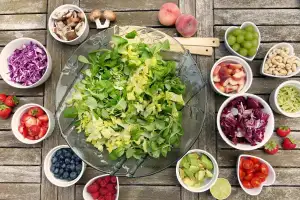Unveiling the Nutritional Secrets: Are Pretzels Truly Healthy?

When it comes to snacking, finding a balance between indulgence and nutritional value can be a challenge. Pretzels, with their crunchy texture and satisfying taste, have long been a popular choice for those seeking a savory treat. But are pretzels truly healthy? In this article, we will delve into the nutritional secrets of pretzels to determine whether they deserve their reputation as a guilt-free snack option. Join us as we explore the composition, benefits, and potential drawbacks of including pretzels in your diet.
Overview of pretzels
Pretzels, a popular snack loved by many, have a long history that dates back to ancient times. These twisted treats are typically made from flour, water, and yeast, which are then baked or fried to achieve their signature crunchy texture. Pretzels come in various shapes and sizes, including the classic knot shape or the bite-sized pretzel sticks. They can be enjoyed plain or flavored with salt, cheese, or even chocolate. With their unique taste and versatility, pretzels have become a staple in snack food culture worldwide.
Nutritional composition of pretzels
Pretzels are a popular snack known for their crunchy texture and unique shape. But what exactly is the nutritional composition of these twisted treats? Let's take a closer look. Pretzels are primarily made from flour, water, yeast, and salt. They are low in fat and cholesterol-free, making them a healthier choice compared to many other snacks. However, it's important to note that not all pretzels are created equal. The nutritional content can vary depending on the brand and preparation method. So, let's dive deeper into the specific nutrients found in pretzels to better understand their overall healthiness.
Calories and portion sizes
Calories and portion sizes play a crucial role in determining the healthiness of any food. When it comes to pretzels, it's important to be mindful of the calorie content and portion sizes. On average, a single serving of pretzels contains around 110-150 calories. However, it's easy to consume more than one serving at a time due to their addictive nature. Therefore, portion control is key when enjoying pretzels as a snack. Opting for smaller portions or pre-packaged single servings can help prevent overindulgence and keep calorie intake in check.
Sodium content
Sodium content is a significant factor to consider when evaluating the healthiness of pretzels. These crunchy snacks are notorious for their high sodium levels. On average, a single serving of pretzels can contain up to 500 milligrams of sodium, which accounts for about 20% of the recommended daily intake. Excessive sodium consumption has been linked to various health issues, including high blood pressure and increased risk of heart disease. Therefore, individuals with hypertension or other sodium-sensitive conditions should be cautious when indulging in pretzels.
Fat content
The fat content in pretzels is relatively low compared to other snack options. A one-ounce serving of pretzels contains about 1 gram of fat. This makes them a healthier choice for those watching their fat intake. However, it's important to note that some flavored or coated pretzels may have higher fat content due to added ingredients. It's always a good idea to check the nutrition label before purchasing. Overall, pretzels can be enjoyed as a low-fat snack option.
Fiber content
Fiber content is an important aspect to consider when evaluating the nutritional value of pretzels. While they may not be as high in fiber as some other snacks, pretzels still contain a decent amount. On average, a serving of pretzels provides around 1-2 grams of dietary fiber. This may not seem like much, but it can contribute to your daily fiber intake. Fiber is known for its ability to promote healthy digestion and prevent constipation. It also helps regulate blood sugar levels and can aid in weight management by promoting feelings of fullness. Although pretzels are not a significant source of fiber, they can still be a part of a balanced diet that includes other high-fiber foods such as fruits, vegetables, and whole grains.
Protein content
Pretzels may not be the first snack that comes to mind when you think of protein, but they do contain a modest amount. A one-ounce serving of pretzels typically provides around 2 grams of protein. While this may not seem like much compared to other protein-rich snacks, such as nuts or Greek yogurt, it can still contribute to your daily protein intake. Protein is essential for building and repairing tissues, supporting immune function, and maintaining healthy hair and nails. So, while pretzels may not be a significant source of protein, they can still provide a small boost to your overall intake.
Vitamins and minerals in pretzels
Vitamins and minerals play a crucial role in maintaining overall health. While pretzels may not be the most nutrient-dense snack, they do contain some essential vitamins and minerals. Pretzels are a good source of iron, which is important for carrying oxygen throughout the body. They also provide small amounts of calcium, necessary for strong bones and teeth. Additionally, pretzels contain trace amounts of vitamins B1 and B3, which help convert food into energy and support proper brain function. Although pretzels may not be a significant source of vitamins and minerals, they can still contribute to your daily nutrient intake.
Health benefits of pretzels
Pretzels may not be the first snack that comes to mind when thinking about health benefits, but they do offer some advantages. Firstly, pretzels are low in fat, making them a healthier alternative to other salty snacks like potato chips. Secondly, they are a good source of carbohydrates, providing quick energy for the body. Additionally, pretzels contain a decent amount of fiber which aids in digestion and helps maintain a healthy weight. Lastly, pretzels also contain small amounts of vitamins and minerals such as iron and niacin. While they may not be the most nutrient-dense snack option, these health benefits make pretzels a reasonable choice for those looking for a satisfying and guilt-free treat.
Potential drawbacks of consuming pretzels
Potential drawbacks of consuming pretzels include their high sodium content, which can contribute to high blood pressure and water retention. Additionally, the refined flour used in pretzels lacks essential nutrients found in whole grains. The low fiber content may lead to digestive issues and a lack of satiety. Pretzels also tend to be low in protein, which is important for muscle repair and growth. Lastly, some commercial varieties may contain unhealthy additives such as artificial flavors and preservatives.
In conclusion, pretzels can be considered a relatively healthy snack option when consumed in moderation. They are low in fat and cholesterol, making them a better alternative to other high-calorie snacks. Pretzels also provide a good amount of fiber, which aids digestion and promotes satiety.
However, it is important to be mindful of portion sizes as they can contribute to excessive calorie intake. The high sodium content in pretzels may also be a concern for individuals with hypertension or those watching their sodium intake.
While pretzels do not offer significant amounts of vitamins and minerals, they still provide some essential nutrients like iron and B vitamins. These nutrients play a vital role in maintaining overall health.
It is worth noting that consuming pretzels alone may not provide all the necessary nutrients for a balanced diet. It is advisable to pair them with other nutrient-rich foods such as fruits, vegetables, or lean proteins.
Ultimately, whether pretzels are a healthy snack choice depends on an individual's dietary needs and preferences. While they can be enjoyed as part of a well-rounded diet, it is essential to consider the overall nutritional profile and consume them in moderation alongside other nutritious foods.
Published: 10. 12. 2023
Category: Health



